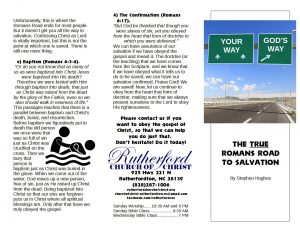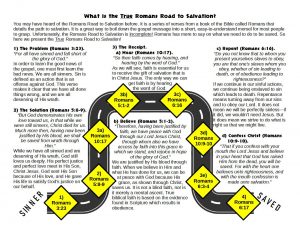When was Jesus actually born? table of contents
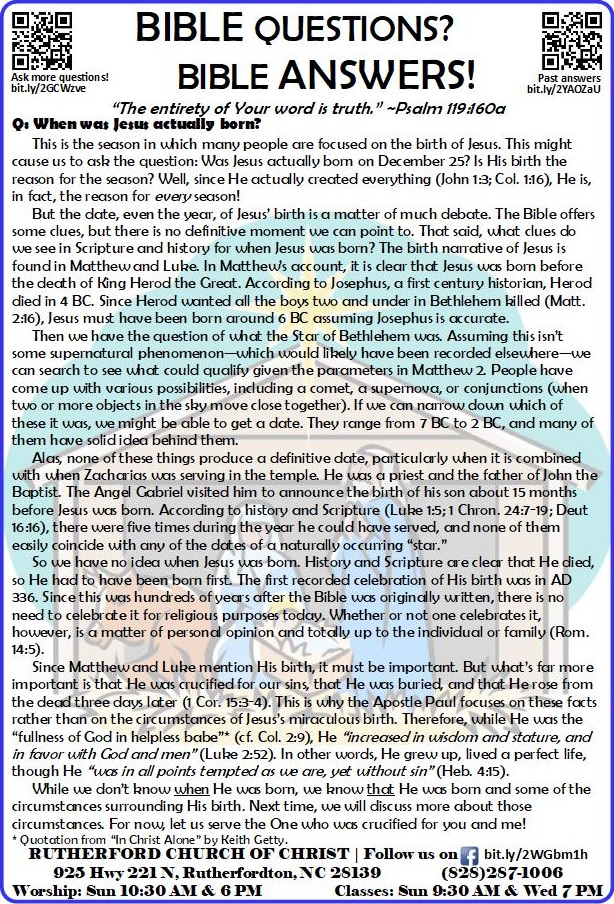 This is the season in which many people are focused on the birth of Jesus. This might cause us to ask the question: Was Jesus actually born on December 25? Is His birth the reason for the season? Well, since He actually created everything (John 1:3; Col. 1:16), He is, in fact, the reason for every season!
This is the season in which many people are focused on the birth of Jesus. This might cause us to ask the question: Was Jesus actually born on December 25? Is His birth the reason for the season? Well, since He actually created everything (John 1:3; Col. 1:16), He is, in fact, the reason for every season!
But the date, even the year, of Jesus’ birth is a matter of much debate. The Bible offers some clues, but there is no definitive moment we can point to. That said, what clues do we see in Scripture and history for when Jesus was born? The birth narrative of Jesus is found in Matthew and Luke. In Matthew’s account, it is clear that Jesus was born before the death of King Herod the Great. According to Josephus, a first century historian, Herod died in 4 BC. Since Herod wanted all the boys two and under in Bethlehem killed (Matt. 2:16), Jesus must have been born around 6 BC assuming Josephus is accurate.
Then we have the question of what the Star of Bethlehem was. Assuming this isn’t some supernatural phenomenon—which would likely have been recorded elsewhere—we can search to see what could qualify given the parameters in Matthew 2. People have come up with various possibilities, including a comet, a supernova, or conjunctions (when two or more objects in the sky move close together). If we can narrow down which of these it was, we might be able to get a date. They range from 7 BC to 2 BC, and many of them have solid idea behind them.
Alas, none of these things produce a definitive date, particularly when it is combined with when Zacharias was serving in the temple. He was a priest and the father of John the Baptist. The Angel Gabriel visited him to announce the birth of his son about 15 months before Jesus was born. According to history and Scripture (Luke 1:5; 1 Chron. 24:7-19; Deut 16:16), there were five times during the year he could have served, and none of them easily coincide with any of the dates of a naturally occurring “star.”
So we have no idea when Jesus was born. History and Scripture are clear that He died, so He had to have been born first. The first recorded celebration of His birth was in AD 336. Since this was hundreds of years after the Bible was originally written, there is no need to celebrate it for religious purposes today. Whether or not one celebrates it, however, is a matter of personal opinion and totally up to the individual or family (Rom. 14:5).
Since Matthew and Luke mention His birth, it must be important. But what’s far more important is that He was crucified for our sins, that He was buried, and that He rose from the dead three days later (1 Cor. 15:3-4). This is why the Apostle Paul focuses on these facts rather than on the circumstances of Jesus’s miraculous birth. Therefore, while He was the “fullness of God in helpless babe”* (cf. Col. 2:9), He “increased in wisdom and stature, and in favor with God and men” (Luke 2:52). In other words, He grew up, lived a perfect life, though He “was in all points tempted as we are, yet without sin” (Heb. 4:15).
While we don’t know when He was born, we know that He was born and some of the circumstances surrounding His birth. Next time, we will discuss more about those circumstances. For now, let us serve the One who was crucified for you and me!
* Quotation from “In Christ Alone” by Keith Getty.
How can we reconcile the two birth narratives in Matthew and Luke? table of contents
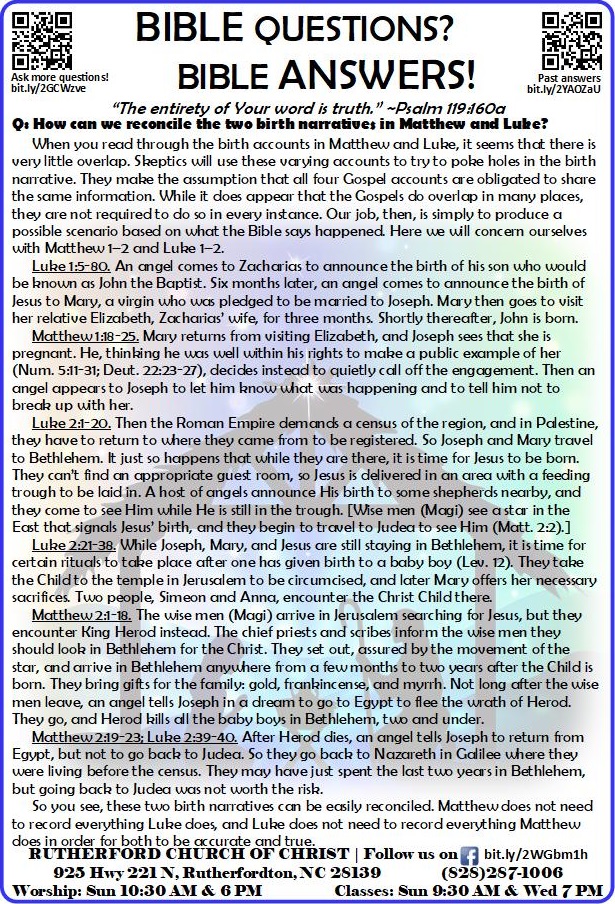 When you read through the birth accounts in Matthew and Luke, it seems that there is very little overlap. Skeptics will use these varying accounts to try to poke holes in the birth narrative. They make the assumption that all four Gospel accounts are obligated to share the same information. While it does appear that the Gospels do overlap in many places, they are not required to do so in every instance. Our job, then, is simply to produce a possible scenario based on what the Bible says happened. Here we will concern ourselves with Matthew 1–2 and Luke 1–2.
When you read through the birth accounts in Matthew and Luke, it seems that there is very little overlap. Skeptics will use these varying accounts to try to poke holes in the birth narrative. They make the assumption that all four Gospel accounts are obligated to share the same information. While it does appear that the Gospels do overlap in many places, they are not required to do so in every instance. Our job, then, is simply to produce a possible scenario based on what the Bible says happened. Here we will concern ourselves with Matthew 1–2 and Luke 1–2.
Luke 1:5-80. An angel comes to Zacharias to announce the birth of his son who would be known as John the Baptist. Six months later, an angel comes to announce the birth of Jesus to Mary, a virgin who was pledged to be married to Joseph. Mary then goes to visit her relative Elizabeth, Zacharias’ wife, for three months. Shortly thereafter, John is born.
Matthew 1:18-25. Mary returns from visiting Elizabeth, and Joseph sees that she is pregnant. He, thinking he was well within his rights to make a public example of her (Num. 5:11-31; Deut. 22:23-27), decides instead to quietly call off the engagement. Then an angel appears to Joseph to let him know what was happening and to tell him not to break up with her.
Luke 2:1-20. Then the Roman Empire demands a census of the region, and in Palestine, they have to return to where they came from to be registered. So Joseph and Mary travel to Bethlehem. It just so happens that while they are there, it is time for Jesus to be born. They can’t find an appropriate guest room, so Jesus is delivered in an area with a feeding trough to be laid in. A host of angels announce His birth to some shepherds nearby, and they come to see Him while He is still in the trough. [Wise men (Magi) see a star in the East that signals Jesus’ birth, and they begin to travel to Judea to see Him (Matt. 2:2).]
Luke 2:21-38. While Joseph, Mary, and Jesus are still staying in Bethlehem, it is time for certain rituals to take place after one has given birth to a baby boy (Lev. 12). They take the Child to the temple in Jerusalem to be circumcised, and later Mary offers her necessary sacrifices. Two people, Simeon and Anna, encounter the Christ Child there.
Matthew 2:1-18. The wise men (Magi) arrive in Jerusalem searching for Jesus, but they encounter King Herod instead. The chief priests and scribes inform the wise men they should look in Bethlehem for the Christ. They set out, assured by the movement of the star, and arrive in Bethlehem anywhere from a few months to two years after the Child is born. They bring gifts for the family: gold, frankincense, and myrrh. Not long after the wise men leave, an angel tells Joseph in a dream to go to Egypt to flee the wrath of Herod. They go, and Herod kills all the baby boys in Bethlehem, two and under.
Matthew 2:19-23; Luke 2:39-40. After Herod dies, an angel tells Joseph to return from Egypt, but not to go back to Judea. So they go back to Nazareth in Galilee where they were living before the census. They may have just spent the last two years in Bethlehem, but going back to Judea was not worth the risk.
So you see, these two birth narratives can be easily reconciled. Matthew does not need to record everything Luke does, and Luke does not need to record everything Matthew does in order for both to be accurate and true. To put them all together, click here: Luke 1:5-80; Matt. 1:18-25; Luke 2:1-38; Matt. 2:1-23; Luke 2:39-40.
What is the significance of the number of fish caught in John 21? table of contents
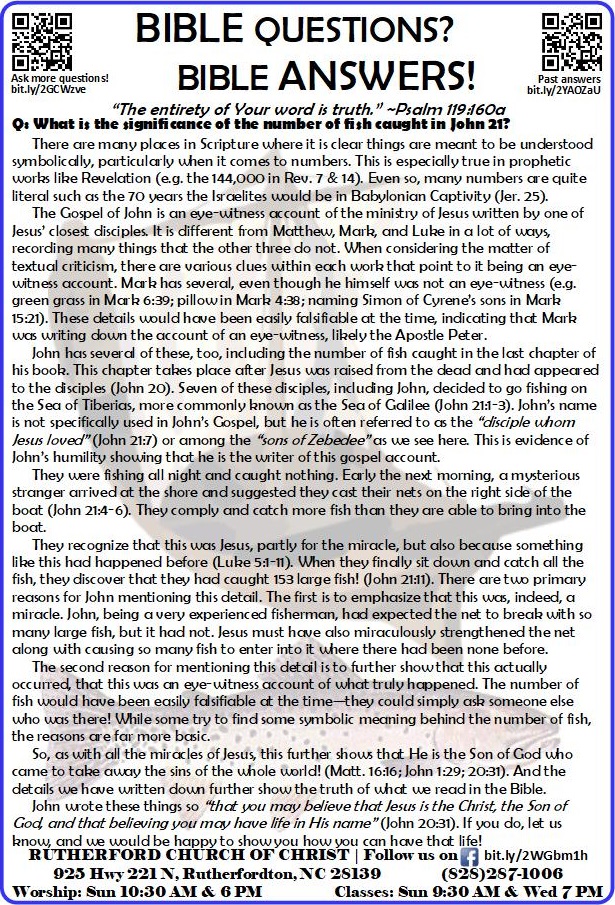 For the next several issues, we have decided it would be good to revisit some older questions to see how we might answer them differently today, three years after we started!
For the next several issues, we have decided it would be good to revisit some older questions to see how we might answer them differently today, three years after we started!
There are many places in Scripture where it is clear things are meant to be understood symbolically, particularly when it comes to numbers. This is especially true in prophetic works like Revelation (e.g. the 144,000 in Rev. 7 & 14). Even so, many numbers are quite literal such as the 70 years the Israelites would be in Babylonian Captivity (Jer. 25).
The Gospel of John is an eye-witness account of the ministry of Jesus written by one of Jesus’ closest disciples. It is different from Matthew, Mark, and Luke in a lot of ways, recording many things that the other three do not. When considering the matter of textual criticism, there are various clues within each work that point to it being an eye-witness account. Mark has several, even though he himself was not an eye-witness (e.g. green grass in Mark 6:39; pillow in Mark 4:38; naming Simon of Cyrene’s sons in Mark 15:21). These details would have been easily falsifiable at the time, indicating that Mark was writing down the account of an eye-witness, likely the Apostle Peter.
John has several of these, too, including the number of fish caught in the last chapter of his book. This chapter takes place after Jesus was raised from the dead and had appeared to the disciples (John 20). Seven of these disciples, including John, decided to go fishing on the Sea of Tiberias, more commonly known as the Sea of Galilee (John 21:1-3). John’s name is not specifically used in John’s Gospel, but he is often referred to as the “disciple whom Jesus loved” (John 21:7) or among the “sons of Zebedee” as we see here. This is evidence of John’s humility showing that he is the writer of this gospel account.
They were fishing all night and caught nothing. Early the next morning, a mysterious stranger arrived at the shore and suggested they cast their nets on the right side of the boat (John 21:4-6). They comply and catch more fish than they are able to bring into the boat.
They recognize that this was Jesus, partly for the miracle, but also because something like this had happened before (Luke 5:1-11). When they finally sit down and catch all the fish, they discover that they had caught 153 large fish! (John 21:11). There are two primary reasons for John mentioning this detail. The first is to emphasize that this was, indeed, a miracle. John, being a very experienced fisherman, had expected the net to break with so many large fish, but it had not. Jesus must have also miraculously strengthened the net along with causing so many fish to enter into it where there had been none before.
The second reason for mentioning this detail is to further show that this actually occurred, that this was an eye-witness account of what truly happened. The number of fish would have been easily falsifiable at the time—they could simply ask someone else who was there! While some try to find some symbolic meaning behind the number of fish, the reasons are far more basic.
So, as with all the miracles of Jesus, this further shows that He is the Son of God who came to take away the sins of the whole world! (Matt. 16:16; John 1:29; 20:31). And the details we have written down further show the truth of what we read in the Bible.
John wrote these things so “that you may believe that Jesus is the Christ, the Son of God, and that believing you may have life in His name” (John 20:31). If you do, let us know, and we would be happy to show you how you can have that life!
How can we reconcile God’s love and judgment? table of contents
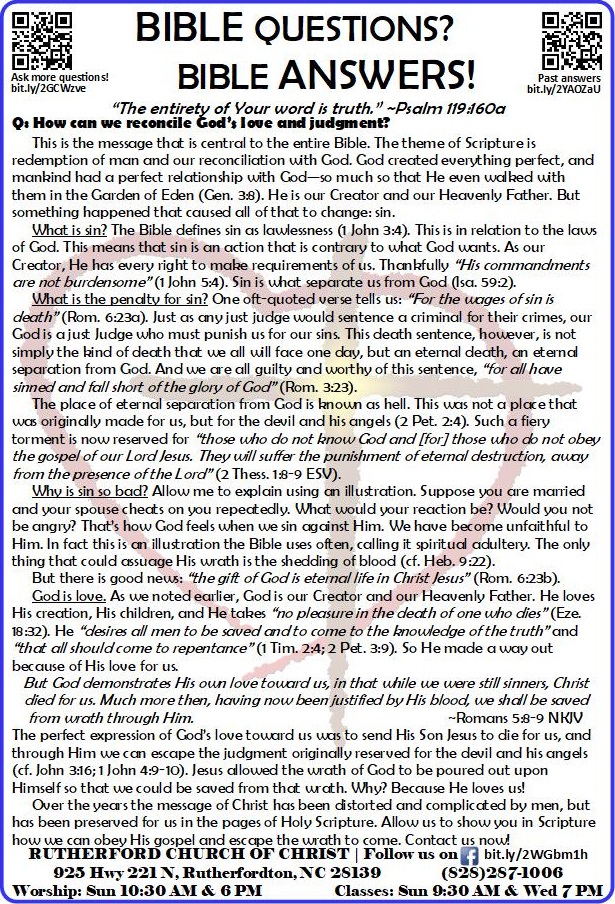 This is the message that is central to the entire Bible. The theme of Scripture is redemption of man and our reconciliation with God. God created everything perfect, and mankind had a perfect relationship with God—so much so that He even walked with them in the Garden of Eden (Gen. 3:8). He is our Creator and our Heavenly Father. But something happened that caused all of that to change: sin.
This is the message that is central to the entire Bible. The theme of Scripture is redemption of man and our reconciliation with God. God created everything perfect, and mankind had a perfect relationship with God—so much so that He even walked with them in the Garden of Eden (Gen. 3:8). He is our Creator and our Heavenly Father. But something happened that caused all of that to change: sin.
What is sin? The Bible defines sin as lawlessness (1 John 3:4). This is in relation to the laws of God. This means that sin is an action that is contrary to what God wants. As our Creator, He has every right to make requirements of us. Thankfully “His commandments are not burdensome” (1 John 5:4). Sin is what separate us from God (Isa. 59:2).
What is the penalty for sin? One oft-quoted verse tells us: “For the wages of sin is death” (Rom. 6:23a). Just as any just judge would sentence a criminal for their crimes, our God is a just Judge who must punish us for our sins. This death sentence, however, is not simply the kind of death that we all will face one day, but an eternal death, an eternal separation from God. And we are all guilty and worthy of this sentence, “for all have sinned and fall short of the glory of God” (Rom. 3:23).
The place of eternal separation from God is known as hell. This was not a place that was originally made for us, but for the devil and his angels (2 Pet. 2:4; Matt. 25:41). Such a fiery torment is now reserved for “those who do not know God and [for] those who do not obey the gospel of our Lord Jesus. They will suffer the punishment of eternal destruction, away from the presence of the Lord” (2 Thess. 1:8-9 ESV).
Why is sin so bad? Allow me to explain using an illustration. Suppose you are married and your spouse cheats on you repeatedly. What would your reaction be? Would you not be angry? That’s how God feels when we sin against Him. We have become unfaithful to Him. In fact this is an illustration the Bible uses often, calling it spiritual adultery. The only thing that could assuage His wrath is the shedding of blood (cf. Heb. 9:22).
But there is good news: “the gift of God is eternal life in Christ Jesus” (Rom. 6:23b).
God is love. As we noted earlier, God is our Creator and our Heavenly Father. He loves His creation, His children, and He takes “no pleasure in the death of one who dies” (Eze. 18:32). He “desires all men to be saved and to come to the knowledge of the truth” and “that all should come to repentance” (1 Tim. 2:4; 2 Pet. 3:9). So He made a way out because of His love for us.
But God demonstrates His own love toward us, in that while we were still sinners, Christ died for us. Much more then, having now been justified by His blood, we shall be saved from wrath through Him.
Romans 5:8-9 NKJV
The perfect expression of God’s love toward us was to send His Son Jesus to die for us, and through Him we can escape the judgment originally reserved for the devil and his angels (cf. John 3:16; 1 John 4:9-10). Jesus allowed the wrath of God to be poured out upon Himself so that we could be saved from that wrath. Why? Because He loves us!
Over the years the message of Christ has been distorted and complicated by men, but has been preserved for us in the pages of Holy Scripture. Allow us to show you in Scripture how we can obey His gospel and escape the wrath to come. Contact us now!
What will Heaven be like? table of contents
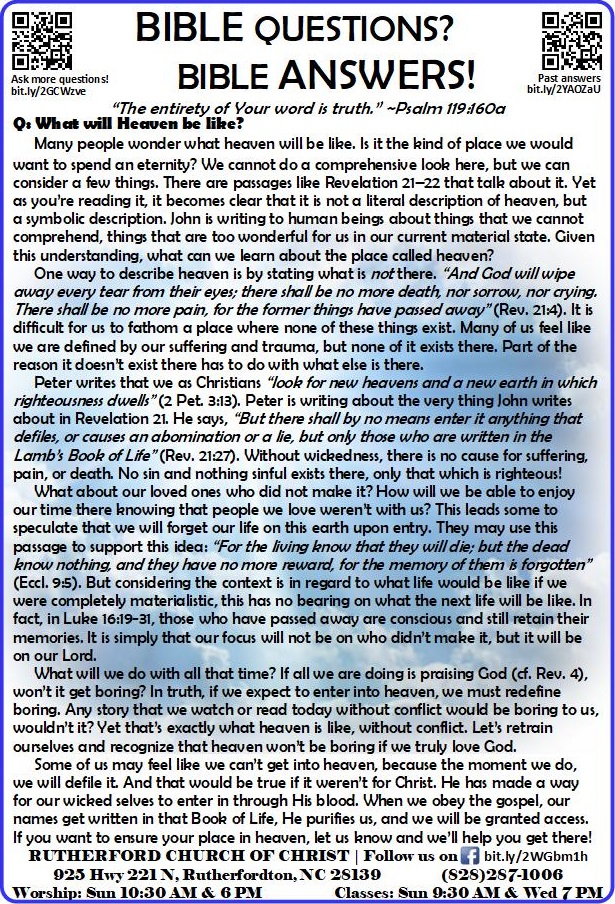 Many people wonder what heaven will be like. Is it the kind of place we would want to spend an eternity? We cannot do a comprehensive look here, but we can consider a few things. There are passages like Revelation 21–22 that talk about it. Yet as you’re reading it, it becomes clear that it is not a literal description of heaven, but a symbolic description. John is writing to human beings about things that we cannot comprehend, things that are too wonderful for us in our current material state. Given this understanding, what can we learn about the place called heaven?
Many people wonder what heaven will be like. Is it the kind of place we would want to spend an eternity? We cannot do a comprehensive look here, but we can consider a few things. There are passages like Revelation 21–22 that talk about it. Yet as you’re reading it, it becomes clear that it is not a literal description of heaven, but a symbolic description. John is writing to human beings about things that we cannot comprehend, things that are too wonderful for us in our current material state. Given this understanding, what can we learn about the place called heaven?
One way to describe heaven is by stating what is not there. “And God will wipe away every tear from their eyes; there shall be no more death, nor sorrow, nor crying. There shall be no more pain, for the former things have passed away” (Rev. 21:4). It is difficult for us to fathom a place where none of these things exist. Many of us feel like we are defined by our suffering and trauma, but none of it exists there. Part of the reason it doesn’t exist there has to do with what else is there.
Peter writes that we as Christians “look for new heavens and a new earth in which righteousness dwells” (2 Pet. 3:13). Peter is writing about the very thing John writes about in Revelation 21. He says, “But there shall by no means enter it anything that defiles, or causes an abomination or a lie, but only those who are written in the Lamb’s Book of Life” (Rev. 21:27). Without wickedness, there is no cause for suffering, pain, or death. No sin and nothing sinful exists there, only that which is righteous!
What about our loved ones who did not make it? How will we be able to enjoy our time there knowing that people we love weren’t with us? This leads some to speculate that we will forget our life on this earth upon entry. They may use this passage to support this idea: “For the living know that they will die; but the dead know nothing, and they have no more reward, for the memory of them is forgotten” (Eccl. 9:5). But considering the context is in regard to what life would be like if we were completely materialistic, this has no bearing on what the next life will be like. In fact, in Luke 16:19-31, those who have passed away are conscious and still retain their memories. It is simply that our focus will not be on who didn’t make it, but it will be on our Lord.
What will we do with all that time? If all we are doing is praising God (cf. Rev. 4), won’t it get boring? In truth, if we expect to enter into heaven, we must redefine boring. Any story that we watch or read today without conflict would be boring to us, wouldn’t it? Yet that’s exactly what heaven is like, without conflict. Let’s retrain ourselves and recognize that heaven won’t be boring if we truly love God.
Some of us may feel like we can’t get into heaven, because the moment we do, we will defile it. And that would be true if it weren’t for Christ. He has made a way for our wicked selves to enter in through His blood. When we obey the gospel, our names get written in that Book of Life, He purifies us, and we will be granted access. If you want to ensure your place in heaven, let us know and we’ll help you get there!
What is Hell like? table of contents
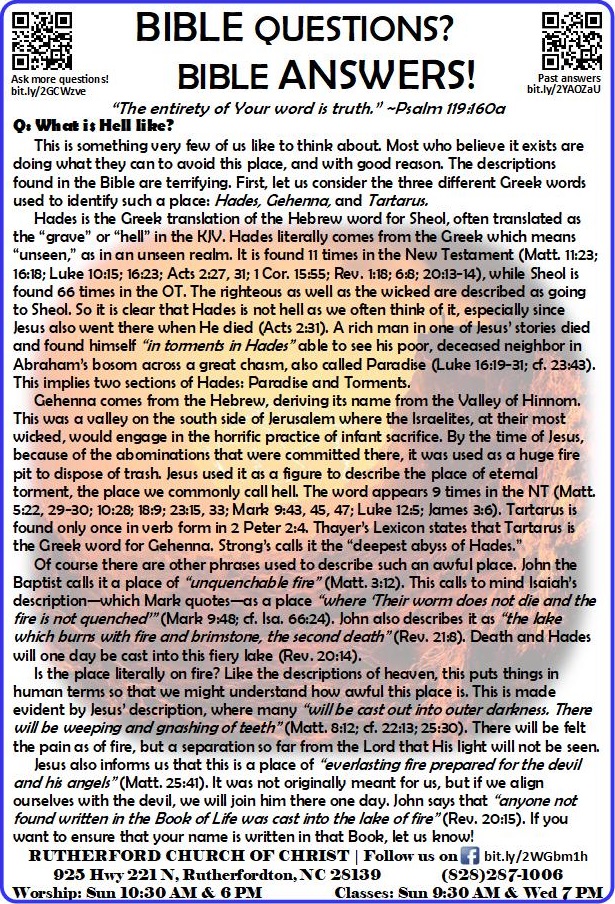 This is something very few of us like to think about. Most who believe it exists are doing what they can to avoid this place, and with good reason. The descriptions found in the Bible are terrifying. First, let us consider the three different Greek words used to identify such a place: Hades, Gehenna, and Tartarus.
This is something very few of us like to think about. Most who believe it exists are doing what they can to avoid this place, and with good reason. The descriptions found in the Bible are terrifying. First, let us consider the three different Greek words used to identify such a place: Hades, Gehenna, and Tartarus.
Hades is the Greek translation of the Hebrew word for Sheol, often translated as the “grave” or “hell” in the KJV. Hades literally comes from the Greek which means “unseen,” as in an unseen realm. It is found 11 times in the New Testament (Matt. 11:23; 16:18; Luke 10:15; 16:23; Acts 2:27, 31; 1 Cor. 15:55; Rev. 1:18; 6:8; 20:13-14), while Sheol is found 66 times in the OT. The righteous as well as the wicked are described as going to Sheol. So it is clear that Hades is not hell as we often think of it, especially since Jesus also went there when He died (Acts 2:31). A rich man in one of Jesus’ stories died and found himself “in torments in Hades” able to see his poor, deceased neighbor in Abraham’s bosom across a great chasm, also called Paradise (Luke 16:19-31; cf. 23:43). This implies two sections of Hades: Paradise and Torments.
Gehenna comes from the Hebrew, deriving its name from the Valley of Hinnom. This was a valley on the south side of Jerusalem where the Israelites, at their most wicked, would engage in the horrific practice of infant sacrifice. By the time of Jesus, because of the abominations that were committed there, it was used as a huge fire pit to dispose of trash. Jesus used it as a figure to describe the place of eternal torment, the place we commonly call hell. The word appears 9 times in the NT (Matt. 5:22, 29-30; 10:28; 18:9; 23:15, 33; Mark 9:43, 45, 47; Luke 12:5; James 3:6). Tartarus is found only once in verb form in 2 Peter 2:4. Thayer’s Lexicon states that Tartarus is the Greek word for Gehenna. Strong’s calls it the “deepest abyss of Hades.”
Of course there are other phrases used to describe such an awful place. John the Baptist calls it a place of “unquenchable fire” (Matt. 3:12). This calls to mind Isaiah’s description—which Mark quotes—as a place “where ‘Their worm does not die and the fire is not quenched’” (Mark 9:48; cf. Isa. 66:24). John also describes it as “the lake which burns with fire and brimstone, the second death” (Rev. 21:8). Death and Hades will one day be cast into this fiery lake (Rev. 20:14).
Is the place literally on fire? Like the descriptions of heaven, this puts things in human terms so that we might understand how awful this place is. This is made evident by Jesus’ description, where many “will be cast out into outer darkness. There will be weeping and gnashing of teeth” (Matt. 8:12; cf. 22:13; 25:30). There will be felt the pain as of fire, but a separation so far from the Lord that His light will not be seen.
Jesus also informs us that this is a place of “everlasting fire prepared for the devil and his angels” (Matt. 25:41). It was not originally meant for us, but if we align ourselves with the devil, we will join him there one day. John says that “anyone not found written in the Book of Life was cast into the lake of fire” (Rev. 20:15). If you want to ensure that your name is written in that Book, let us know!
What about Purgatory? table of contents
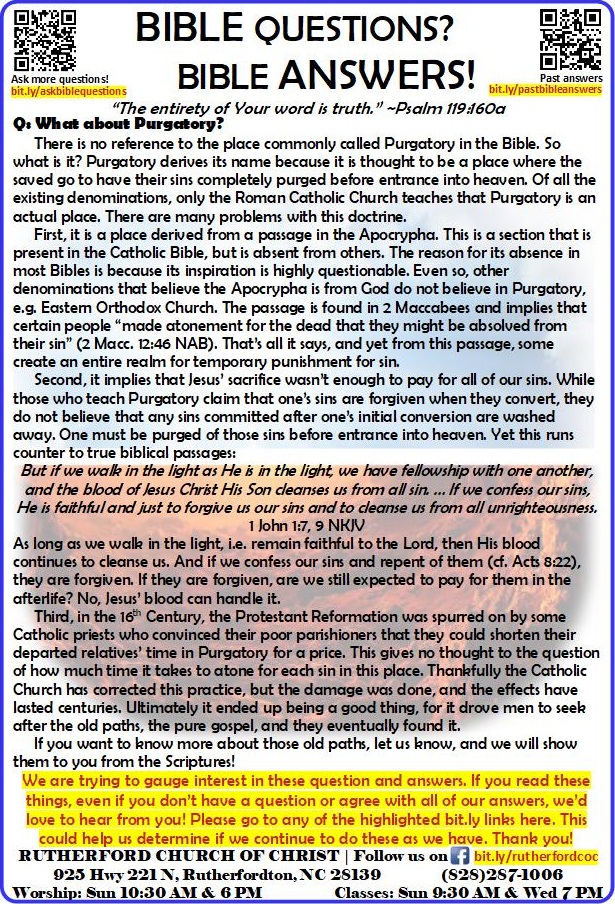 There is no reference to the place commonly called Purgatory in the Bible. So what is it? Purgatory derives its name because it is thought to be a place where the saved go to have their sins completely purged before entrance into heaven. Of all the existing denominations, only the Roman Catholic Church teaches that Purgatory is an actual place. There are many problems with this doctrine.
There is no reference to the place commonly called Purgatory in the Bible. So what is it? Purgatory derives its name because it is thought to be a place where the saved go to have their sins completely purged before entrance into heaven. Of all the existing denominations, only the Roman Catholic Church teaches that Purgatory is an actual place. There are many problems with this doctrine.
First, it is a place derived from a passage in the Apocrypha. This is a section that is present in the Catholic Bible, but is absent from others. The reason for its absence in most Bibles is because its inspiration is highly questionable. Even so, other denominations that believe the Apocrypha is from God do not believe in Purgatory, e.g. Eastern Orthodox Church. The passage is found in 2 Maccabees and implies that certain people “made atonement for the dead that they might be absolved from their sin” (2 Macc. 12:46 NAB). That’s all it says, and yet from this passage, some create an entire realm for temporary punishment for sin.
Additional: There are actually quite a few problems with this passage in 2 Maccabees that we didn’t have space to get into in the original article. The entire context is found in 2 Maccabees 12:38-46. The first thing to note is that the dead mentioned in this passage were Jews under the Old Testament Law, and there were clear signs of idolatry on their bodies. The penalty for idolatry in the OT Law was death (Deut. 17:2-7). Even in the New Testament system, one cannot inherit the kingdom of God if he is guilty of idolatry (1 Cor. 6:9). No amount of prayer of the living was going to allow the dead idolaters to inherit the kingdom of God. The passage actually admits that “it would have been superfluous and foolish to pray for the dead” if there were no resurrection of the dead. But it makes me wonder what their conception of the resurrection was. The writer of Hebrews informs us that “it is appointed for men to die once, but after this the judgment” (Heb. 9:27). So we will be judged after death, and nothing that happens in the resurrection can absolve us of whatever sins we committed in life. As Jesus says, “Do not marvel at this; for the hour is coming in which all who are in the graves will hear His voice and come forth — those who have done good, to the resurrection of life, and those who have done evil, to the resurrection of condemnation” (John 5:28-29). Only the blood of Christ can absolve us of our sins, and only prior to judgment while we are among the living (1 Cor. 6:9-11; Rom. 5:9). This book of 2 Maccabees clearly is not inspired as it shows a lack of understanding of the nature of the resurrection as revealed later in the New Testament.
Second, it implies that Jesus’ sacrifice wasn’t enough to pay for all of our sins. While those who teach Purgatory claim that one’s sins are forgiven when they convert, they do not believe that any sins committed after one’s initial conversion are washed away. One must be purged of those sins before entrance into heaven. Yet this runs counter to true biblical passages:
But if we walk in the light as He is in the light, we have fellowship with one another, and the blood of Jesus Christ His Son cleanses us from all sin. … If we confess our sins, He is faithful and just to forgive us our sins and to cleanse us from all unrighteousness.
1 John 1:7, 9 NKJV
As long as we walk in the light, i.e. remain faithful to the Lord, then His blood continues to cleanse us. And if we confess our sins and repent of them (cf. Acts 8:22), they are forgiven. If they are forgiven, are we still expected to pay for them in the afterlife? No, Jesus’ blood can handle it.
Third, in the 16th Century, the Protestant Reformation was spurred on by some Catholic priests who convinced their poor parishioners that they could shorten their departed relatives’ time in Purgatory for a price. This gives no thought to the question of how much time it takes to atone for each sin in this place. Thankfully the Catholic Church has corrected this practice, but the damage was done, and the effects have lasted centuries. Ultimately it ended up being a good thing, for it drove men to seek after the old paths, the pure gospel, and they eventually found it.
If you want to know more about those old paths, let us know, and we will show them to you from the Scriptures!
Is the Romans Road to Salvation biblical? table of contents
 The Romans Road to Salvation is a series of verses from Paul’s letter to the Romans that details the path to salvation. It is a great way to boil down the gospel message into a short, easy-to-understand morsel for most people to grasp. Unfortunately, the Romans Road to Salvation that some denominations teach is incomplete! Romans has more to say on what we need to do to be saved. So is what they teach biblical? Not entirely. Below we present some of the things they include and some they omit.
The Romans Road to Salvation is a series of verses from Paul’s letter to the Romans that details the path to salvation. It is a great way to boil down the gospel message into a short, easy-to-understand morsel for most people to grasp. Unfortunately, the Romans Road to Salvation that some denominations teach is incomplete! Romans has more to say on what we need to do to be saved. So is what they teach biblical? Not entirely. Below we present some of the things they include and some they omit.
The Problem—Romans 3:23 – In order to learn the good news of the gospel, one must first learn the bad news. We are all sinners. Sin is defined as an action that is an offense against God. This verse makes it clear that we have all done things wrong, and we are all deserving of His wrath.
The Solution—Romans 5:8-9 – While we have all sinned and are deserving of His wrath, God still loves us deeply. His perfect justice and perfect love meet in His Son, Christ Jesus. God sent His Son because of His love, and He gave His life to satisfy God’s justice on our behalf.
The Receipt:
- Hear—Romans 10:17 – As we will see, faith is essential for us to receive the gift of salvation that is in Christ Jesus. The only way we can get faith is by hearing the word of God.
- Believe—Romans 5:1-2 – We are justified by His blood through faith. When we believe in Him and what He has done for us, we can be at peace with God because His grace, as shown through Christ, saves us. It is not a blind faith, nor is it merely a mental ascent. True biblical faith is based on the evidence found in Scripture which results in obedience.
- Repent—Romans 6:16 – If we continue in our sinful actions, we continue being enslaved to sin which leads to death. Repentance means turning away from our sins and to obey our Lord. It does not mean we will be perfectly sinless—if it did, we wouldn’t need Jesus. It does mean we strive to do what is right so that we might live.
- Confess Christ—Romans 10:9-10 – Unfortunately, this is where the Romans Road ends for most people. But it doesn’t get you all the way to salvation. Confessing Christ as Lord is vitally important, but this is not the point at which one is saved.
- Baptism—Romans 6:3-4 – This passage teaches that there is a parallel between baptism and Christ’s death, burial, and resurrection. Before baptism we figuratively put to death the old person we once were that was so full of sin just as Christ was crucified on the cross. Then we bury that person in baptism just as Christ was buried in the grave. When we come out of the water, God raises up a new person, free of sin, just as He raised up Christ from the dead. Being baptized into Christ so that our sins are forgiven puts us in Christ where all spiritual blessings are. Only after that have we truly obeyed the gospel.
Please contact us if you want to obey the gospel of Christ, so that we can help you!
Included is a brochure we have handed out that relays similar information, but goes into more detail.
What did Jesus say about homosexuality? table of contents
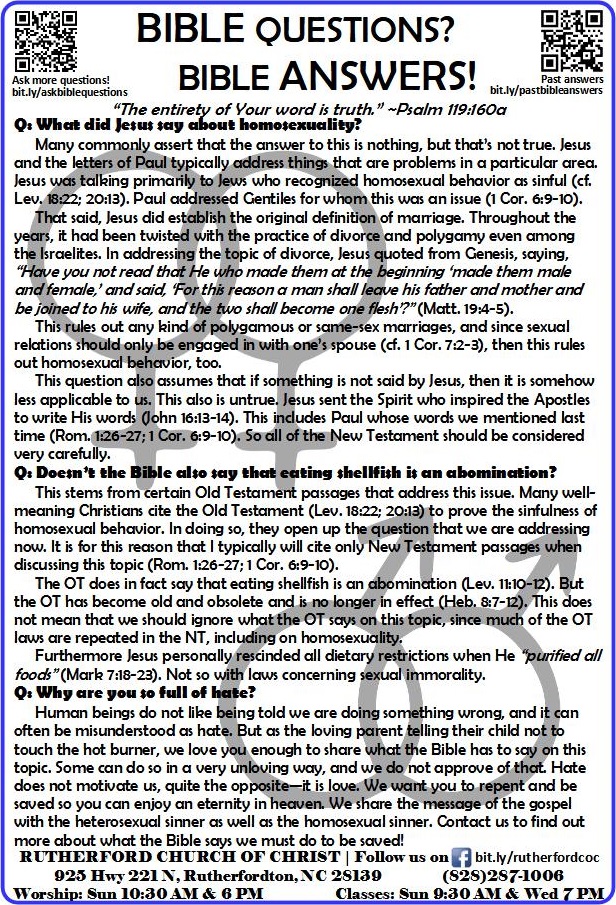 Many commonly assert that the answer to this is nothing, but that’s not true. Jesus and the letters of Paul typically address things that are problems in a particular area. Jesus was talking primarily to Jews who recognized homosexual behavior as sinful (cf. Lev. 18:22; 20:13). Paul addressed Gentiles for whom this was an issue (1 Cor. 6:9-10).
Many commonly assert that the answer to this is nothing, but that’s not true. Jesus and the letters of Paul typically address things that are problems in a particular area. Jesus was talking primarily to Jews who recognized homosexual behavior as sinful (cf. Lev. 18:22; 20:13). Paul addressed Gentiles for whom this was an issue (1 Cor. 6:9-10).
That said, Jesus did establish the original definition of marriage. Throughout the years, it had been twisted with the practice of divorce and polygamy even among the Israelites. In addressing the topic of divorce, Jesus quoted from Genesis, saying, “Have you not read that He who made them at the beginning ‘made them male and female,’ and said, ‘For this reason a man shall leave his father and mother and be joined to his wife, and the two shall become one flesh’?” (Matt. 19:4-5).
This rules out any kind of polygamous or same-sex marriages, and since sexual relations should only be engaged in with one’s spouse (cf. 1 Cor. 7:2-3), then this rules out homosexual behavior, too.
This question also assumes that if something is not said by Jesus, then it is somehow less applicable to us. This also is untrue. Jesus sent the Spirit who inspired the Apostles to write His words (John 16:13-14). This includes Paul whose words we mentioned last time (Rom. 1:26-27; 1 Cor. 6:9-10). So all of the New Testament should be considered very carefully.
Doesn’t the Bible also say that eating shellfish is an abomination? table of contents
This stems from certain Old Testament passages that address this issue. Many well-meaning Christians cite the Old Testament (Lev. 18:22; 20:13) to prove the sinfulness of homosexual behavior. In doing so, they open up the question that we are addressing now. It is for this reason that I typically will cite only New Testament passages when discussing this topic (Rom. 1:26-27; 1 Cor. 6:9-10).
The OT does in fact say that eating shellfish is an abomination (Lev. 11:10-12). But the OT has become old and obsolete and is no longer in effect (Heb. 8:7-12). This does not mean that we should ignore what the OT says on this topic, since much of the OT laws are repeated in the NT, including on homosexuality.
Furthermore Jesus personally rescinded all dietary restrictions when He “purified all foods” (Mark 7:18-23). Not so with laws concerning sexual immorality.
Why are you Christians so full of hate? table of contents
Human beings do not like being told we are doing something wrong, and it can often be misunderstood as hate. But as the loving parent telling their child not to touch the hot burner, we love you enough to share what the Bible has to say on this topic. Some can do so in a very unloving way, and we do not approve of that. Hate does not motivate us, quite the opposite—it is love. We want you to repent and be saved so you can enjoy an eternity in heaven. We share the message of the gospel with the heterosexual sinner as well as the homosexual sinner. Contact us to find out more about what the Bible says we must do to be saved!
Why does God need to be worshiped? table of contents
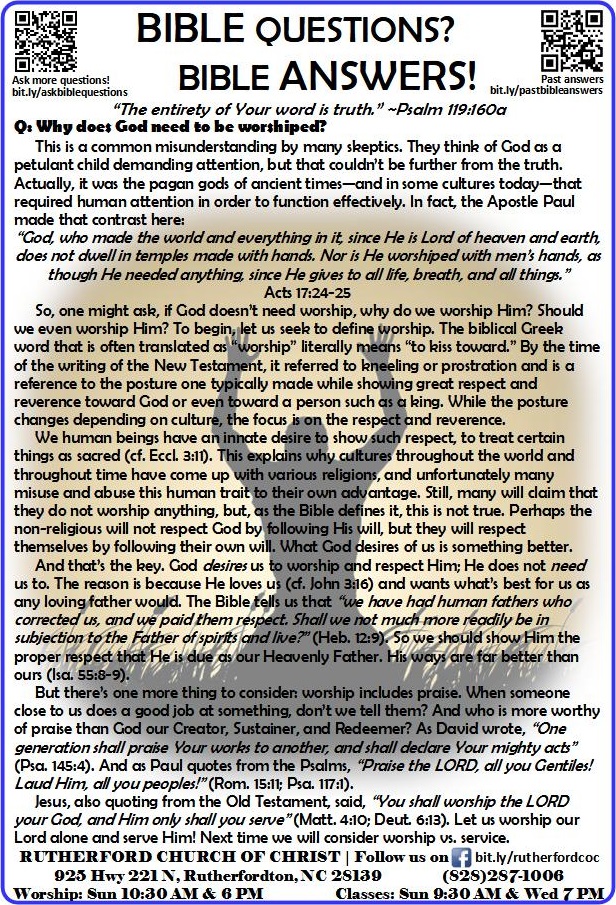 This is a common misunderstanding by many skeptics. They think of God as a petulant child demanding attention, but that couldn’t be further from the truth. Actually, it was the pagan gods of ancient times—and in some cultures today—that required human attention in order to function effectively. In fact, the Apostle Paul made that contrast here:
This is a common misunderstanding by many skeptics. They think of God as a petulant child demanding attention, but that couldn’t be further from the truth. Actually, it was the pagan gods of ancient times—and in some cultures today—that required human attention in order to function effectively. In fact, the Apostle Paul made that contrast here:
“God, who made the world and everything in it, since He is Lord of heaven and earth, does not dwell in temples made with hands. Nor is He worshiped with men’s hands, as though He needed anything, since He gives to all life, breath, and all things.”
Acts 17:24-25
So, one might ask, if God doesn’t need worship, why do we worship Him? Should we even worship Him? To begin, let us seek to define worship. The biblical Greek word that is often translated as “worship” literally means “to kiss toward.” By the time of the writing of the New Testament, it referred to kneeling or prostration and is a reference to the posture one typically made while showing great respect and reverence toward God or even toward a person such as a king. While the posture changes depending on culture, the focus is on the respect and reverence.
We human beings have an innate desire to show such respect, to treat certain things as sacred (cf. Eccl. 3:11). This explains why cultures throughout the world and throughout time have come up with various religions, and unfortunately many misuse and abuse this human trait to their own advantage. Still, many will claim that they do not worship anything, but, as the Bible defines it, this is not true. Perhaps the non-religious will not respect God by following His will, but they will respect themselves by following their own will. What God desires of us is something better.
And that’s the key. God desires us to worship and respect Him; He does not need us to. The reason is because He loves us (cf. John 3:16) and wants what’s best for us as any loving father would. The Bible tells us that “we have had human fathers who corrected us, and we paid them respect. Shall we not much more readily be in subjection to the Father of spirits and live?” (Heb. 12:9). So we should show Him the proper respect that He is due as our Heavenly Father. His ways are far better than ours (Isa. 55:8-9).
But there’s one more thing to consider: worship includes praise. When someone close to us does a good job at something, don’t we tell them? And who is more worthy of praise than God our Creator, Sustainer, and Redeemer? As David wrote, “One generation shall praise Your works to another, and shall declare Your mighty acts” (Psa. 145:4). And as Paul quotes from the Psalms, “Praise the LORD, all you Gentiles! Laud Him, all you peoples!” (Rom. 15:11; Psa. 117:1).
Jesus, also quoting from the Old Testament, said, “You shall worship the LORD your God, and Him only shall you serve” (Matt. 4:10; Deut. 6:13). Let us worship our Lord alone and serve Him! Next time we will consider worship vs. service.
